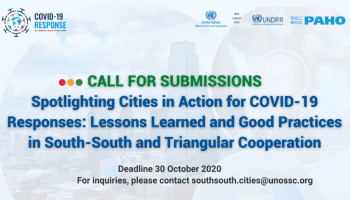
Cities around the world are already spearheading innovative solutions in many areas of low-emission climate-resilient development and environmental sustainability, including energy, transportation, water and waste management and disaster risk reduction. Cities are also increasingly joining forces and learning from each other to collectively strengthen environmental protection. The United Nations Office for South-South Cooperation (UNOSSC) is supporting these efforts by fostering city-to-city partnerships, the exchange of innovative approaches, and the development of urban pilot projects in developing countries.
Since 2017, UNOSSC has been running the Cities Project with support of the Government of China to promote South-South and triangular cooperation (SSTC) under the Belt and Road Initiative towards achieving the Sustainable Development Goals (SDGs) at the city level. The Cities Project is a demand-driven initiative that responds to local needs by facilitating and providing support for knowledge sharing and capacity development as well as for pilot projects that foster technology transfer, trade and investments.
Since 1978, the United Nations Human Settlements Programme (UN-Habitat), the United Nations programme for human settlements and sustainable urban development has been working to promote socially and environmentally sustainable towns and cities. To deliver its mandate, UN-Habitat provides technical assistance to countries and cities in the areas of urban governance, housing, land, environmental management, public spaces, urban safety, water and waste management, energy and mobility. With its vision of “a better quality of life for all in an urbanizing world”, UN-Habitat works with partners to build inclusive, safe, resilient and sustainable cities and communities while promoting urbanization as a positive transformative force for people and communities, reducing inequality, discrimination and poverty. “Strengthened climate action and improved urban environment “is a key pillar of UN-Habitat’s current strategic plan (2020-2023). UN-Habitat promotes low-carbon and climate resilient urbanisation and works with cities to improve access to basic services such as water supply, sanitation, transport, energy and waste management.
What are we looking for?
Examples of innovative environmental sustainability and climate solutions in cities that fulfill the following criteria:
- Include South-South or triangular cooperation approaches
- Are scalable and replicable
- Involve a local government or municipal authority
Why respond to this call?
- Be featured as a case study in the forthcoming joint publication by UNOSSC and UN-Habitat as well as on UN-Habitat’s New Urban Agenda website
- Inspire your peers and partners around the world through UNOSSC’s and UN-Habitat’s global outreach channels and platforms
- Become part of UNOSSC’s cities thematic clusters network to exchange experiences and learn about knowledge-sharing and pilot project opportunities
- Join UN-Habitat’s Waste Wise Cities programme
Please submit your initiative/project by 5 June 2021 via the online form available here
How It Works
About SSG - South-South Galaxy (southsouth-galaxy.org)
South-South Galaxy, a global knowledge sharing and partnership brokering platform, supported by UNOSSC, UN agencies and development partners, serves as a consolidated South-South solutions platform for Southern partners and the UN system, and acts as a one-stop-shop for all partners to utilize.
South-South Galaxy connects and links all of the existing South-South knowledge sharing platforms, making it easier for Southern partners to access, navigate and use. It will enable users to access a broad range of knowledge, solutions, research, partners and capacity development initiatives.
Southern partners will be able to publish their Southern development solutions and needs, exchange knowledge, foster partnerships, access cutting-edge research, feature and engage in capacity building initiatives, and connect the UN system and South-South partners.
South-South Galaxy will also connect Southern partners with financing mechanisms, and most importantly, it will provide advisory services by linking Southern partners with thematic experts from UN agencies to provide implementation support, when requested.










Add new comment